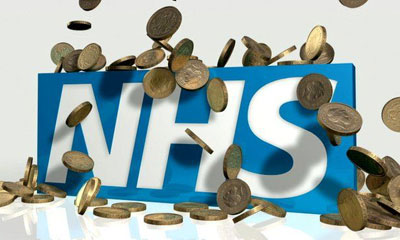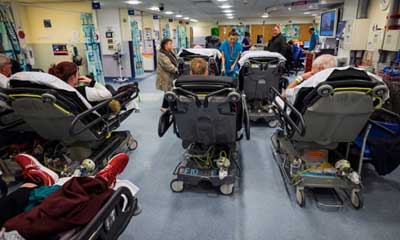If you have any departmental or Trust news you'd like to share, please get in touch.
- Details
The NHS has saved hundreds of people from sepsis thanks to better use of digital technology in hospitals. In a major nationwide push to tackle the condition, including a one hour identification and treatment ambition, new ‘alert and action’ technology is being introduced which uses algorithms to read patients’ vital signs and alert medics to worsening conditions that are a warning sign of sepsis.
Sepsis – also known as blood poisoning – is a life-threatening response to an infection in the body, where the immune system damages tissues and organs. Three leading hospitals are using alerts to help identify sepsis and tell doctors when patients with the serious condition are getting worse, ahead of the measures being rolled out across England as part of the NHS Long Term Plan. NHS leaders in Cambridge, Liverpool and Berkshire are now helping the rest of the health service to adopt tools to spot it, which costs 37,000 lives a year and is notoriously difficult to identify.
Read more: Hundreds of lives saved through new technology to spot sepsis
- Details
More than 60% of personal data breaches reported to the Information Commissioner’s Office (ICO) this year were caused by human error, with healthcare the most-affected sector.
Figures obtained by data security solutions firm Egress via a Freedom of Information (FOI) request reveal that 4,856 breaches were reported to the ICO between 1st January and 20th June 2019.
Of those incidents, nearly half (43%) was the result of incorrect disclosure – made up of 20% posting or faxing data to the incorrect recipient, 18% emailing information to incorrect recipients or failing to use Bcc, and 5% providing data in response to a phishing attack.
The remaining 17% was due to data or wrong data shown in a client portal, failure to redact, incorrect disposal of paperwork, loss/theft of paperwork left in insecure location or verbal disclosure of personal data.
Read more: Healthcare sector most affected by personal data breaches
- Details

The government has announced it is setting up a national artificial intelligence laboratory, accompanied by £250m in funding to help enhance patient care and research using AI.
The third announcement for the NHS from Boris Johnson’s government in as many days, the prime minister said the funding will help the NHS become a world leader in using artificial intelligence to improve healthcare.
The government said the National Artificial Intelligence Lab will “build cutting edge treatments for cancer, dementia and heart disease” by working on digital advances to improve the detection of diseases.
Johnson announced: “My task is to ensure the NHS has the funding it needs to make a real difference to the lives of staff and patients. Transforming care through artificial intelligence is a perfect illustration of that.”
- Details
 Nine out of 10 patients have “confidence and trust” in their family doctor as well as other general practice staff such as nurses and pharmacists, according to new research published today. Patients rate their overall experience of their family doctor highly, with four out of five saying their GP treats them with “care and concern” and provides them with enough time to listen to their needs. With patient choice a priority the NHS Long Term Plan, nine out of 10 patients felt involved in decisions about their care, while seven in 10 rated their overall experience of making a GP appointment as “good”, the GP patient survey shows.
Nine out of 10 patients have “confidence and trust” in their family doctor as well as other general practice staff such as nurses and pharmacists, according to new research published today. Patients rate their overall experience of their family doctor highly, with four out of five saying their GP treats them with “care and concern” and provides them with enough time to listen to their needs. With patient choice a priority the NHS Long Term Plan, nine out of 10 patients felt involved in decisions about their care, while seven in 10 rated their overall experience of making a GP appointment as “good”, the GP patient survey shows.
Dr Nikita Kanani, acting director of primary care for NHS England, said: “Family doctors in England see nearly one million people every day and this survey shows they appreciate the fantastic job they do alongside other practice staff such as nurses and pharmacists.” However, GPs continue to face pressure and increasing demand and while seven in 10 patients were satisfied with the appointment they were offered, some patients were waiting longer than they would have liked to see their GP.
- Details
 Up to 500 delegates voted overwhelmingly in favour of abandoning the fees at the British Medical Association’s annual conference in Belfast. ‘We are doctors not border guards,’ said Dr Omar Risk in Monday’s debate. ‘Charging migrants for accessing NHS services is a fundamentally racist endeavour – we are complicit in the oppressive regime.’ Medics backing the motion said charging made health staff ‘complicit in racism’ and ‘racial profiling’.
Up to 500 delegates voted overwhelmingly in favour of abandoning the fees at the British Medical Association’s annual conference in Belfast. ‘We are doctors not border guards,’ said Dr Omar Risk in Monday’s debate. ‘Charging migrants for accessing NHS services is a fundamentally racist endeavour – we are complicit in the oppressive regime.’ Medics backing the motion said charging made health staff ‘complicit in racism’ and ‘racial profiling’.
Doctors who opposed the move were booed as they spoke. Conservative MPs said that opening up the NHS to the rest of the world was reckless when its resources were so stretched. Health tourism is thought to cost anything from £200million to £2billion a year. The BMA, which is one of the country’s most powerful trade unions, will now lobby the Department of Health to overhaul the charging system. Although the Government sets the rules, they function only if doctors follow them.
Read more: Doctors vote to stop charging overseas patients for their treatment at NHS hospitals


